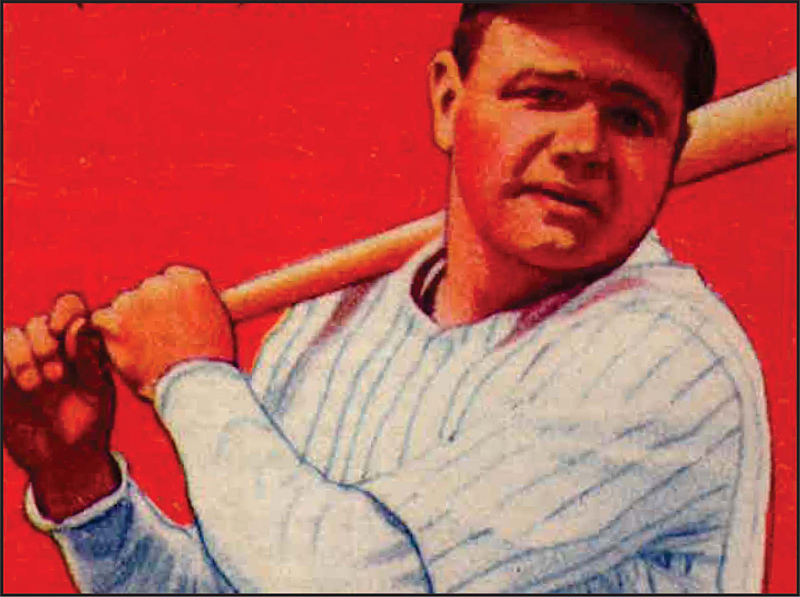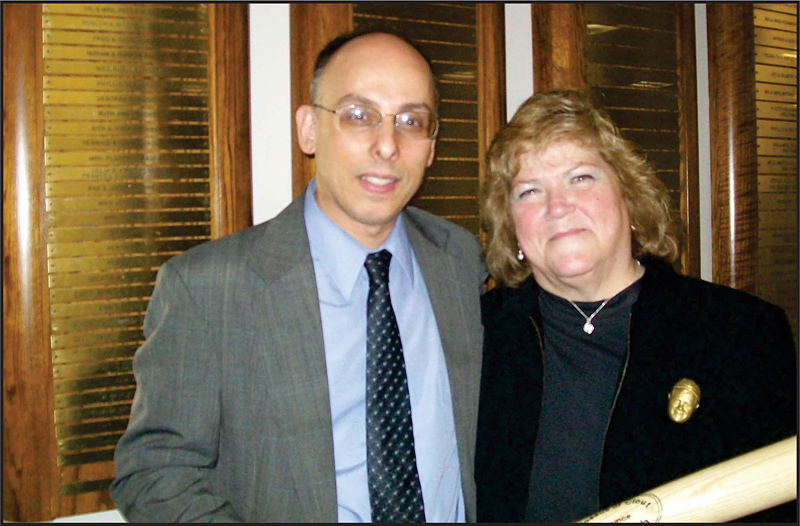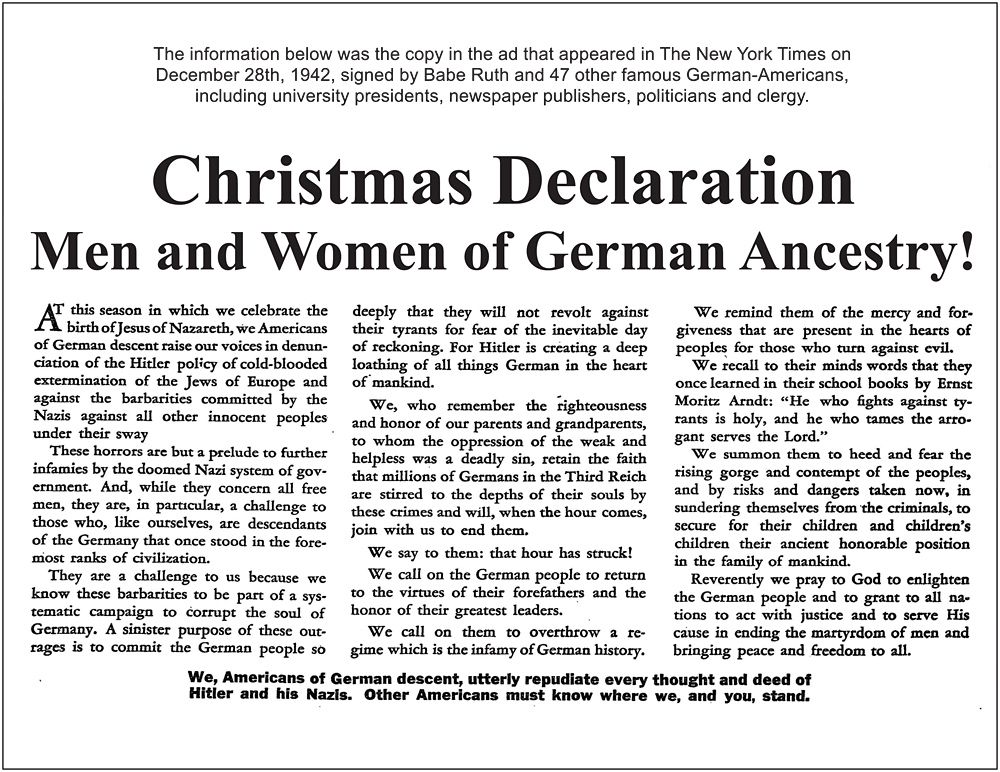Babe Ruth Blasted Hitler During WWII
The legendary athlete Joined other prominent German-Americans in denouncing Hitler's policy of extermination of Jews as barbaric and called for the overthrow of the Third Reich.
By Gabriel Garrett and Les Wolff
George Herman (Babe) Ruth.
Rafael Medoff (left), the Founding Director of The Davis Wyman Institute for Holocaust Studies, and Linda Tosetti, the granddaughter of Babe Ruth.
The crowd was bustling at The National Jewish Sports Hall of Fame, with dozens of famous Jewish faces engraved in plaques staring down at us from the walls. The news was out: Babe Ruth did something to help the Jews during the Holocaust, and this crowd - Babe Ruth fans and members of the Jewish community alike, wanted to hear about it.
It was Rafael Medoff, the founding director of The David Wyman Institute for Holocaust Studies that discovered what Babe Ruth had done. In response to hearing about the film “Universal Babe”, which focuses on how Babe Ruth was truly a Universal kind of guy, who focused on using an American pastime to bring all races together, Rafael had discovered an advertisement made by German Americans which called for Americans to oppose Hitler and Nazism. Among the list of 50 signatories for this advertisement was George Herman Ruth, the Babe himself.
There were a fair amount of people in the crowd who saw this as something small, and only slightly helpful to the Jewish community. Some did not see this as a big deal and one man asked “Why did Babe Ruth not speak out against anti-semitism during this time period? Why did he not do more for the Jewish people?”
However, what needs to be understood is that during this time period, German Americans were openly organizing Nazi rallies in support of Hitler, sometimes with over 20,000 participants. To be a German American, and speak out against Hitler, was going against the grain. But it was after Dorothy Thompson, the first journalist to be kicked out of Nazi Germany for criticizing the Nazi government, began a campaign to get German Americans to sign a Christmas-time advertisement to appeal to the Christian side of America to denounce Hitler and his policies, that the tables began to turn. She managed to convince Ruth to sign on, and he was one of the most highly regarded figures on the list.
The ad reads “At this season in which we celebrate the birth of Jesus of Nazareth, we Americans of German descent raise our voices in denunciation of the Hitler policy of cold-blooded extermination of the Jews of Europe and against the barbarities committed by the Nazis against all other innocent people under their sway.....We call on them [the German people] to return to the virtues of their forefathers and the honor of their greatest leaders... Reverently we pray to God to enlighten the German people and to grant to all nations to act with justice and to serve his cause in ending the martyrdom of men and bringing peace and freedom to all.”
The ad was published in 10 different major newspapers, including the New York Times. For such a large American figure to actually take a political position to increase awareness was a very rare thing, and had a big influence. Pressure began to increase on the American government to actually take action. The publication of the ad itself by German Americans was an incredible action, because even many Jewish American leaders absolutely abandoned their German counterparts, and totally refused to take any action themselves.
The action of supporting this advertisement was only one example of how Ruth was truly a universal, colorblind kind of guy. The documentary “Universal Babe” by Byron C. Hunter exemplifies how he did not care about a man’s skin color, he simply loved baseball. During a season, the Babe would play 15 barnstorming games, and at least 5 of these would be against the Negro League. It would not even be out of any sort of activism, but simply because the Negro League had very, very good players, and he loved to play.
Byron tells us that while most Ruth documentaries focus on his sports career, his focuses more on his interpersonal relationships with people. He had the great benefit of having Ruth’s granddaughter tell many personal stories, and had the opportunity to see many household artifacts of Babe to have a more personal understanding of his life. Being an orphan himself, the film showed how Babe would take every opportunity he could to cheer up sick kids in hospitals, and to make the days of children who showed up to his games by hitting home runs for them.
He even visited Japan to play a game there, and felt he had improved Japanese-American relations, until the day of the Pearl Harbor attacks. However, there are still statues of Babe Ruth in Japan to this day.
He was a supporter of all things baseball, and Hank Greenberg, who had 331 home runs, and nearly broke Babe Ruth’s record, was walked a record 15.9 times as he approached the record. When asked about what Babe Ruth would have thought about Greenberg breaking his record, his granddaughter replied “My grandfather would have been fine, and he wouldn’t have liked the politics of setting somebody up from doing it. For Pete’s sake just pitch to the guy.”
For Babe, race did not matter in Baseball. It was something to bring all races together, and in this way, Ruth helped turn Baseball into an American pastime, and when he saw a wrong, he wanted to make a right. His actions may seem small to us, but all it takes is one small action that stands up against what is wrong when so many view it as right, to begin a change in this world. Ruth lived in a very antisemitic time period, and his stand against his fellow Hitler-supporting German Americans, and his stand against Hitler, even when so many Jewish Americans said nothing, was heroic in the sense that so few highly-respected American figures had anything to say about it. This was a time when Ruth only had something to lose by performing such an action, but luckily, his good deed was not lost in the annals of history.
“Humanitarian.” said Linda Ruth Tosetti, when asked what the one thing she wished for her grandfather, Babe Ruth, to be remembered as.



